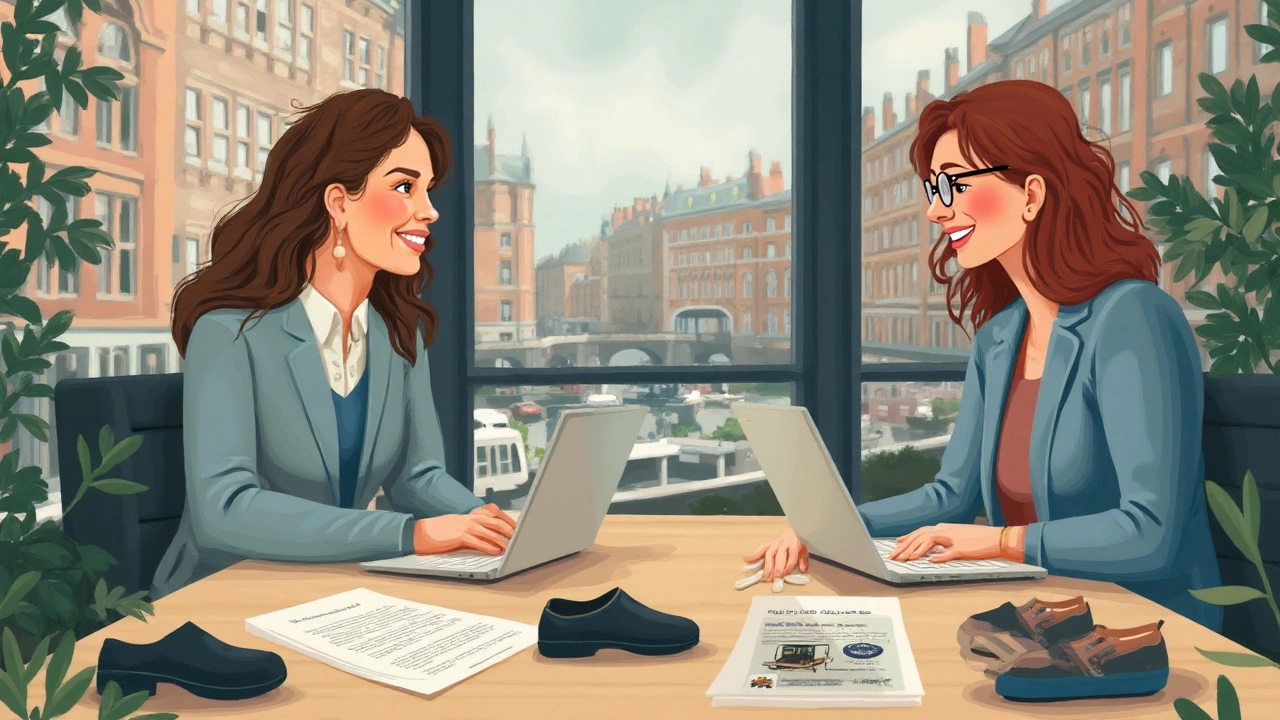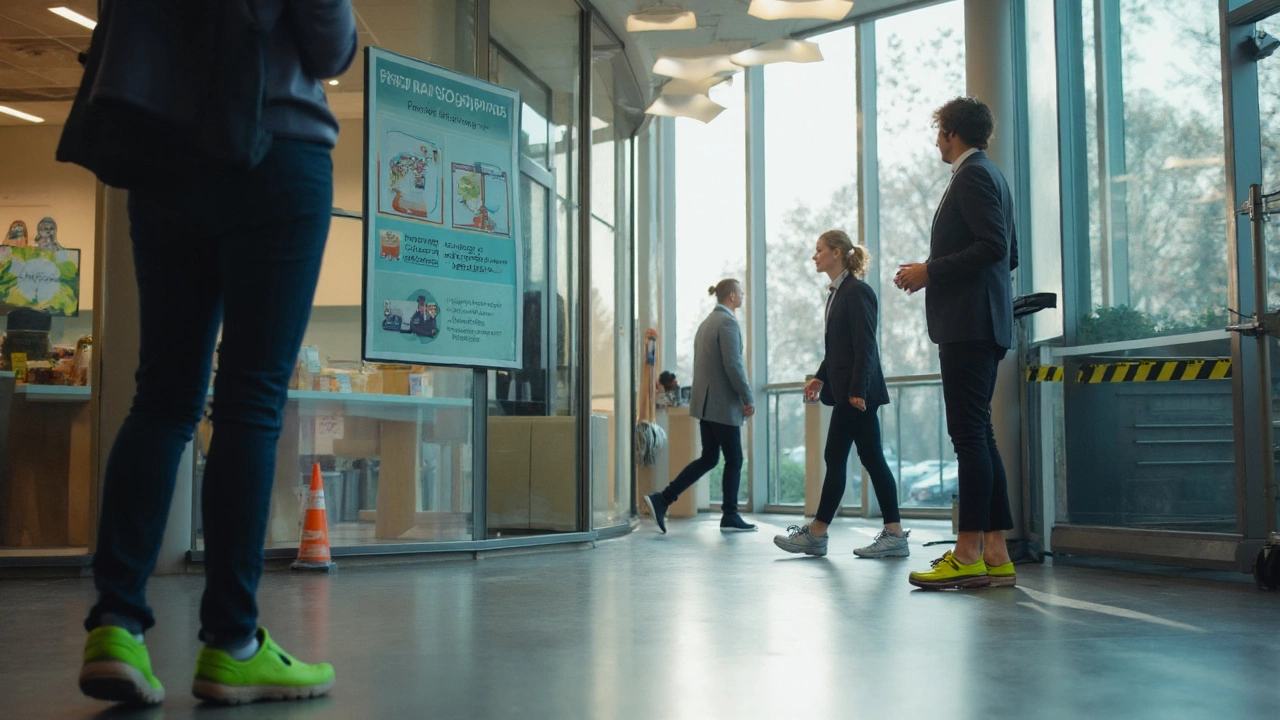If you’ve ever wondered why Crocs draw frowns in offices in Ireland, you’re not imagining it. Plenty of Irish workplaces-banks in the IFSC, semi-states in Dublin 2, agencies in Ringsend, even SMEs in Cork and Galway-either discourage or flat-out ban them. The core issue isn’t fashion snobbery. It’s risk, insurance, and client perception-plus the simple need for a tidy, consistent standard. I’ll explain how Irish employers think about footwear, where Crocs are a hard no, where they’re borderline, and what to wear instead if you need comfort for long commutes, rainy mornings, and endless meetings.
- TL;DR: Most Irish offices ban Crocs for safety (slip/open heel issues), hygiene, and brand image. Insurers and clients expect neat, closed shoes.
- Law & policy: Employers must keep workplaces safe; dress codes must be reasonable and consistent. That’s the balancing act.
- Reality check: Finance, law, and public-facing roles = rarely acceptable. Tech and creative = maybe on casual days, but check the handbook.
- Smart swaps: Closed leather/synthetic shoes with cushioned soles beat Crocs for comfort and compliance. Ecco, Clarks, Skechers Work, and Vionic do well in the Irish market.
- Negotiating with HR: If you’ve a medical need, request a reasonable accommodation with a GP note and propose compliant closed-toe options.
What’s really behind Crocs bans in Irish offices
Let’s cut to it: most bans aren’t about fashion taste. They’re about risk and reputation in Irish workplaces.
Crocs office Ireland-that phrase triggers three concerns in HR and management meetings: safety, insurance, and brand standards. Crocs are often open-heel, sometimes ventilated at the toe, and famously loose. That’s comfy, but those features are red flags in many risk assessments.
Safety comes first. The Health and Safety Authority (HSA) prioritises preventing slips, trips and falls-they’re among the top causes of workplace accidents here. Footwear matters. Loose or open-back styles can reduce stability on wet lobbies, polished stone floors, and metal stairs-common in Dublin and Cork office blocks. If the building management emails about ‘wet floors near the entrance’ on a rainy Tuesday, that’s more risk than you think.
Insurance is next. Employer liability insurers want predictable, defensible policies. If an employee slips in open-back clogs, the claim scrutiny starts with the footwear policy. This is why many Irish companies default to ‘closed-toe, closed-heel, non-slip’ as a simple, defendable rule.
Then image and client perception: banking meetings on North Wall Quay, briefing a minister in Government Buildings, or pitching to a US multinational in Grand Canal Dock-Crocs send the wrong signal. Dress codes aren’t just internal-they project your firm’s standards to clients and stakeholders.
Uniformity matters too. Once you allow casual clogs, where do you draw the line? That’s why HR prefers clear boundary lines: no flip-flops, no slippers, no Crocs. It’s easier to explain and enforce.
Under the Safety, Health and Welfare at Work Act 2005, every employer shall ensure, so far as is reasonably practicable, the safety, health and welfare at work of his or her employees.
That legal duty shapes footwear rules. The HSA also notes that suitable footwear reduces slip risk. In higher-risk settings-labs, kitchens, hospitals-open designs are often banned outright. Many Irish hospitals follow infection-control guidance where perforated shoes are out; hospitality insists on slip-resistant, closed footwear; and facilities teams rely on steel-toe or protective shoes when on-site.
One more practical point: Crocs squeak and slap on polished floors. Noise and distraction aren’t top of the list, but in quiet offices (think legal or audit teams) this can be another nudge towards ‘no’.
How to tell if your office will allow Crocs (and what to do next)
You don’t need to guess. Irish companies usually spell this out in the contract pack or the employee handbook. Here’s a tidy way to find out-no drama, no awkwardness.
- Check your handbook and onboarding docs: Look for ‘Dress Code’, ‘Health & Safety’, or ‘Workwear’. Many Irish employers copy-paste lines like ‘clean, closed-toe shoes’ or ‘no casual clogs’.
- Risk profile test: Are you client-facing, visiting regulated sites, or moving between buildings? If yes, odds of a Crocs ban go up.
- Ask your manager, not the group chat: A quick, polite ask-‘Are Crocs okay on casual days if I’m not meeting clients?’-gets you a clear answer.
- Check for sector norms: Banks, law firms, public sector, and pharma are stricter. Startups and agencies can be looser, especially on remote or in-house days.
- Observe the floor: Slippy stone in the lobby? Metal stairs to the canteen? Building risks push policy towards closed-heel shoes.
- If you need them for health reasons: Gather a GP/physio note and propose a specific, closed-toe, black or navy option. Make it easy for HR to say yes.
I’ve seen the Dublin pattern countless times: tech teams in Docklands often go very casual on internal days, but throw on smarter shoes for client meetings. In finance around the IFSC, the default is ‘no’-unless it’s a charity day costume and even then, someone in compliance frowns.
| Irish workplace | Are Crocs typically allowed? | Why/Policy logic | Compliant alternatives |
|---|---|---|---|
| Finance (IFSC, Sandyford) | Rarely | Client image, formal dress code, insurer comfort | Leather loafers, dress sneakers (low-profile), Derby shoes |
| Tech (Grand Canal Dock, Galway City) | Sometimes on internal days | Casual culture but risk-managed for client visits | Minimalist sneakers, sleek clogs (closed-back), smart casual boots |
| Public sector / Semi-state | Unlikely | Professional standards, public-facing roles | Closed-toe flats, loafers, brogues |
| Healthcare (HSE hospitals, clinics) | Often banned | Infection control, sharps, slip risk | Medical clogs (closed), washable closed shoes, PPE-compliant |
| Hospitality & Retail | Rare; depends on model | Slip resistance, spill protection | Slip-resistant closed shoes (SRA/SRB), safety clogs |
| Construction / Facilities | No | PPE standards (toe/sole protection) | Safety boots/shoes (EN ISO 20345) |

Comfortable, Irish-weather-proof alternatives that pass the dress code
Let’s keep what you actually want: comfort, cushioning, and breathability-without raising HR eyebrows. These options are easy to find in Ireland (think Arnotts, Brown Thomas, Schuh, Elverys for sporty styles, local independents, or Irish web shops):
- Leather or vegan loafers with cushioned insoles: Classic, office-safe, and kinder to your feet than stiff formals. Ecco and Clarks do great all-day comfort. Expect €80-€160 in Ireland, depending on sales.
- Dress sneakers (low profile): Think muted colours, minimal branding, clean lines. Vionic, Ecco, and Nike’s more minimal lines can work in tech or casual offices. Keep them clean and you’re fine on most Irish ‘smart casual’ policies.
- Closed-back clogs that don’t look like shower shoes: Dansko and Birkenstock ‘Boston’ (leather) can be acceptable in creative or tech spaces. Choose black or dark brown. The closed toe and heel strap help tick safety boxes.
- Skechers Work or similar slip-resistant shoes: Good for hospitality or retail roles where you need comfort and grip. Pairs well with Irish winters and slick tiles.
- Gore-Tex or water-resistant office shoes: Dublin rain is real. A subtle waterproof Derby or Chelsea boot saves you from soaked socks while still looking sharp. Look for rubber soles for grip.
- Orthotic-friendly insoles and wider fits: If Crocs helped because of plantar fasciitis or bunions, swap in supportive insoles (Superfeet, Sorbothane) and pick wider lasts. Many Irish stockists can fit you properly.
Pro tip for hybrid workers: commute in whatever you like-runners, even Crocs-and swap at the desk. Keep a neutral pair in your pedestal drawer and a microfibre cloth. Nobody complains about clean, closed shoes that look put-together.
If you still love Crocs: when they might be ok-and how to get a yes
I get it-Crocs are light, forgive a long walk from Heuston, and dry fast after a downpour. If you want to try for approval, be deliberate.
- Pick the right model: Closed-toe, closed-heel or with a secure heel strap. Avoid perforations. Dark colours (black/navy) only.
- Limit the context: Wear them at your desk on non-client days. Switch to smart shoes for meetings, town halls, or site visits.
- Make a safety case: Choose a pair with decent tread and a non-slip sole. Clean the soles-grit and dust kill traction on polished floors.
- Ask the right way: Email HR/manager with a short, practical request-‘Here’s the exact pair. Closed toe/heel, non-slip. Only on internal days.’
- Medical route if needed: Bring a GP or physio note. Under Irish equality law, employers should consider reasonable accommodation. Offer two or three compliant shoe models so it’s not a blank cheque.
Remember: if your role touches regulated clients (finance, pharma, public service), your manager may not have discretion. Don’t take a ‘no’ personally-it’s usually insurance-driven, not style policing.

Checklists, scripts, and quick answers
Use these to make a quick, confident decision-or to get an answer from HR without awkward back-and-forth.
Fast acceptability checklist (Irish offices)
- Is your shoe closed-toe and closed-heel? If not, stop-the answer is likely ‘no’.
- Is your day client-facing or public-facing? If yes, wear smart shoes.
- Is the building floor slick (stone/tiles), and is it raining? Play it safe.
- Does your handbook mention ‘no casual clogs / flip-flops’? That usually includes Crocs.
- Could you defend this choice to your insurer if someone slipped? If you’d hesitate, HR will too.
Comfort-first alternatives checklist
- Look for cushioning under the heel and forefoot (EVA, PU, gel).
- Choose grippy rubber outsoles; avoid slick leather soles in winter.
- Pick a wider toe box if you need Crocs-level space.
- Stick to black, navy, dark brown for fewer questions.
- Add insoles if you stand a lot; replace them every 6-12 months.
Quick script to ask HR
‘Hi [Name], quick one on footwear. On internal days with no client meetings, would closed-toe, closed-heel clogs (dark colour, non-slip) be acceptable at my desk? Happy to switch to smarter shoes for meetings/site visits.’
Mini‑FAQ
Are Crocs business casual?
In most Irish offices, business casual still expects closed, structured shoes. Crocs-especially ventilated or open-back versions-usually don’t make the cut.
What about ‘casual Fridays’ in Dublin?
Clothes relax; footwear rules rarely do. If the handbook says ‘closed-toe shoes’, stick with that on Fridays too.
Are Crocs allowed in hospitals in Ireland?
Many hospital departments ban perforated or open-back shoes for infection control and safety. Some approved medical clogs exist, but they’re typically closed and washable, not standard Crocs.
Can I wear Crocs if I don’t leave my desk?
Maybe in very casual tech or creative teams-if your manager says okay and you have closed-toe/heel versions. The walk from the lobby still counts for safety.
What if I’ve a medical reason?
Ask for a reasonable accommodation with a GP/physio note. Propose specific closed-toe options that look office-appropriate.
Are ‘safety Crocs’ a thing?
Some clogs meet slip or even toe-protection standards, but standard Crocs often don’t. If you need PPE, ask for certified safety footwear (EN ISO 20345 for toe protection; check slip ratings like SRA/SRB/SRC).
Do Irish laws force dress codes?
No law forces a dress code, but the employer’s safety duty and brand standards justify reasonable rules. CIPD Ireland encourages dress codes to be clear, fair, and consistent.
Next steps and troubleshooting
If you’re an employee:
- Check your handbook today. If shoes aren’t specified, ask your manager for a quick steer.
- If it’s a no, pick a comfy alternative this week-loafers or dress sneakers with proper cushioning.
- If you need accommodation, get a short note and propose two specific, closed-toe models.
If you’re a manager/HR in Ireland:
- Write the policy in plain English: ‘Closed-toe, closed-heel, non-slip soles. No flip-flops or casual clogs (including Crocs).’
- Add a discretion clause for medical needs and role-specific exceptions. Keep it consistent across teams.
- Coordinate with your insurer and facilities team so policy maps to real building risks.
If you’re hybrid/remote:
- Commute in comfort; change at your desk. Keep a neutral pair in the office.
- On video calls, shoes don’t matter-just don’t forget for surprise on-sites.
Hospitality/Healthcare note:
- Pick footwear with certified slip resistance and closed design. Over here, insurers and inspectors pay attention.
- If your current shoes slide on wet tiles, swap them now. Grip beats style when a tray of coffee goes flying.
Irish weather, Irish floors, Irish clients-put all three together and Crocs struggle to pass the test in offices. Keep your comfort, just move it into a pair that looks tidy, closes at the heel and toe, and won’t land on an incident form after a rainy lunchtime near the revolving doors at Molesworth Street.
